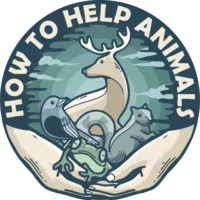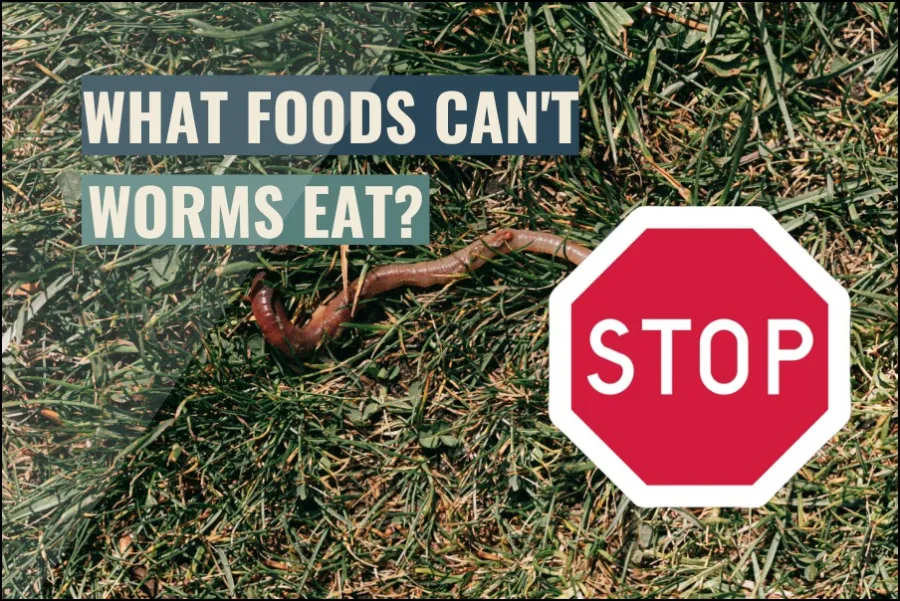
Worms are a vital component of many ecosystems, and they play a key role in the decomposition of organic matter. However, not all foods are suitable for worms to eat. In this article, we will explore the types of food that worms should avoid and discuss the potential consequences of feeding them these materials.
Worms cannot eat non-biodegradable materials, such as plastics, metal, or glass. They should also avoid highly processed or refined foods, as well as any food that has been treated with chemicals or pesticides. In general, worms should be fed a varied diet of organic materials, such as fruit and vegetable scraps, coffee grounds, and shredded paper or cardboard.
Worms are essential for breaking down organic matter and turning it into nutrient-rich compost, which can then be used to enrich soil and support plant growth. However, it’s important to feed worms the right types of food, as they cannot break down non-biodegradable materials such as plastics or metal, and they should also avoid highly processed or refined foods. Feeding worms the wrong types of food can have negative consequences, including physical injury or death, contamination of the compost with toxic chemicals, and imbalance in the compost or worm bin ecosystem. In this article, we will delve into the specific types of food that worms should avoid and the potential impacts of feeding them these materials.
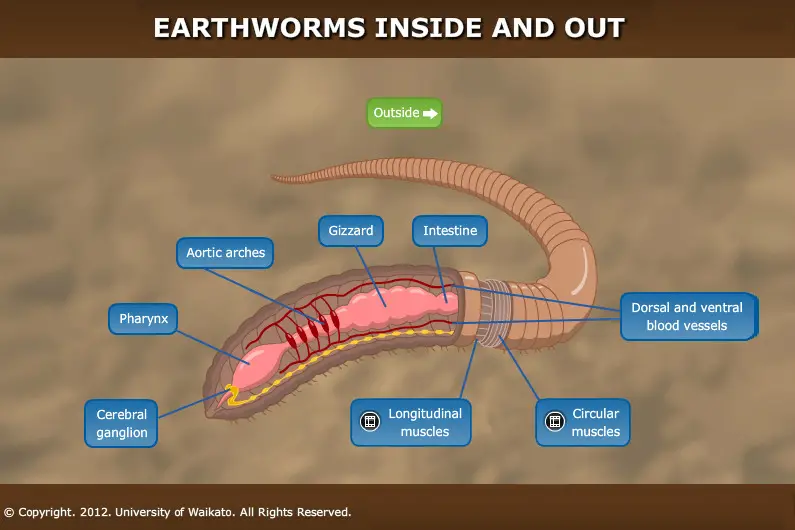
The digestive system of worms and how they process food
Worms have a simple yet efficient digestive system that allows them to break down and process organic matter. Their digestive system consists of a mouth, pharynx, esophagus, crop, gizzard, intestine, and anus.
The worm’s mouth is located on the underside of its head and is used to take in food. The pharynx is a muscular tube that extends from the mouth to the esophagus and helps move food down the digestive tract. The esophagus is a tube that connects the pharynx to the crop, which is a muscular sac located near the worm’s head. The crop stores and moistens food, helping to break it down before it moves on to the gizzard.
The gizzard is a muscular sac located towards the middle of the worm’s body. It grinds and breaks down food particles using small particles of grit or soil that the worm has ingested. The gizzard’s muscular contractions help to grind and crush the food, making it easier for the intestine to absorb nutrients.
The intestine is a long, tubular organ that runs the length of the worm’s body and is responsible for absorbing nutrients from the digested food. The intestine is lined with tiny finger-like projections called microvilli, which help to increase the surface area for absorption. Any undigested material is eliminated through the anus, located at the posterior end of the worm’s body.
Worms are able to break down a wide range of organic materials, including plant matter, kitchen scraps, and even animal manure. They do this by secreting enzymes and bacteria from their bodies, which help to break down the complex molecules in these materials into simpler compounds that can be absorbed and used by the worm’s body.
In addition to their role in breaking down organic matter, worms also help to aerate and enrich the soil with their burrowing and feeding activities. This makes them valuable contributors to a healthy ecosystem and a valuable tool in sustainable agriculture and composting.
💡 Did you know we have written an article about what fruits you can add to your vermicompost?
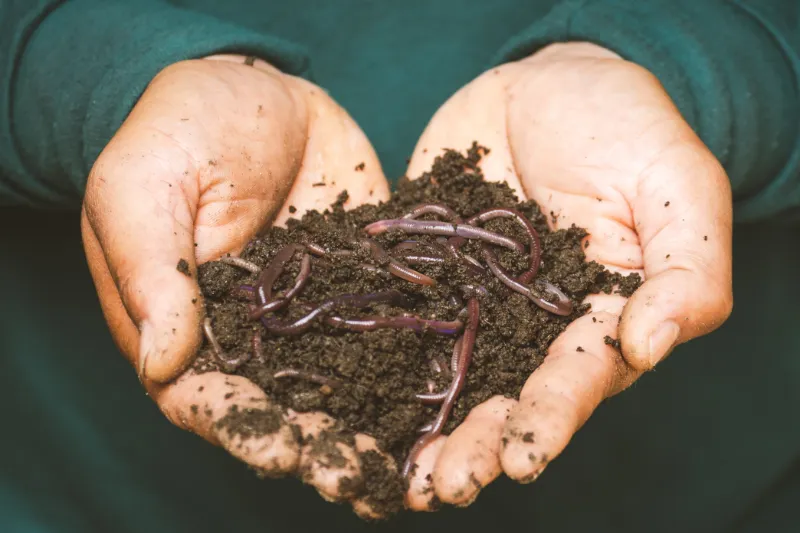
What part does worms play in composting?
Worms play a vital role in the composting process, breaking down organic matter and converting it into nutrient-rich compost. Composting is a natural process that occurs when organic materials, such as food scraps and yard waste, are broken down by microorganisms and decomposers, such as worms, into a soil-like substance. This process helps to recycle nutrients back into the soil, improving soil structure and fertility and reducing the amount of waste sent to landfills.
Worms are able to break down a wide range of organic materials, including fruit and vegetable scraps, coffee grounds, shredded paper and cardboard, and even animal manure. They do this by secreting enzymes and bacteria from their bodies, which help to break down the complex molecules in these materials into simpler compounds that can be absorbed and used by the worm’s body.
However, there are some materials that worms cannot break down. These include non-biodegradable materials such as plastics, metal, and glass, as well as highly processed or refined foods that are low in nutrients and are difficult for worms to digest. It is important to avoid adding these materials to your compost bin or worm bin, as they can contaminate the compost and potentially harm the worms.
Common mistakes in feeding worms and how to avoid them
Here are some common mistakes that people make when feeding worms, along with ways to avoid them:
- Feeding worms too much food: It is important to avoid overfeeding your worms, as this can lead to excess moisture and an accumulation of uneaten food in the worm bin. This can create an unpleasant smell and attract pests, such as flies. To avoid overfeeding your worms, only add small amounts of food at a time and wait until it has been fully consumed before adding more.
- Feeding worms the wrong types of food: As mentioned earlier, worms cannot break down non-biodegradable materials such as plastics, metal, or glass. It is also important to avoid feeding worms highly processed or refined foods, as well as any food that has been treated with chemicals or pesticides. Instead, feed your worms a varied diet of organic materials, such as fruit and vegetable scraps, coffee grounds, and shredded paper or cardboard.
- Feeding worms too frequently: While worms do need a regular supply of food to survive, it is important to avoid feeding them too frequently. This can lead to an excess of food in the worm bin, which can create problems as mentioned above. It is generally recommended to feed worms once or twice a week, depending on the size of the bin and the number of worms.
- Not properly storing food for worms: If you are planning to feed your worms later, it is important to store the food correctly to prevent it from spoiling or attracting pests. Keep food scraps in a covered container in the refrigerator or freezer until you are ready to feed them to the worms. This will help to preserve the food and keep it fresh.
- Not properly preparing the food: In order to make it easier for worms to consume and digest the food, it is important to chop or shred it into small pieces. This will also help to speed up the decomposition process. Avoid adding large chunks of food or whole pieces of fruit or vegetables, as these can be difficult for worms to break down.
By following these guidelines and avoiding these common mistakes, you can help to ensure that your worms are well-fed and healthy, and that your compost bin or worm bin is functioning efficiently.
💡 Have you read our complete guide on what food you can give your worms?
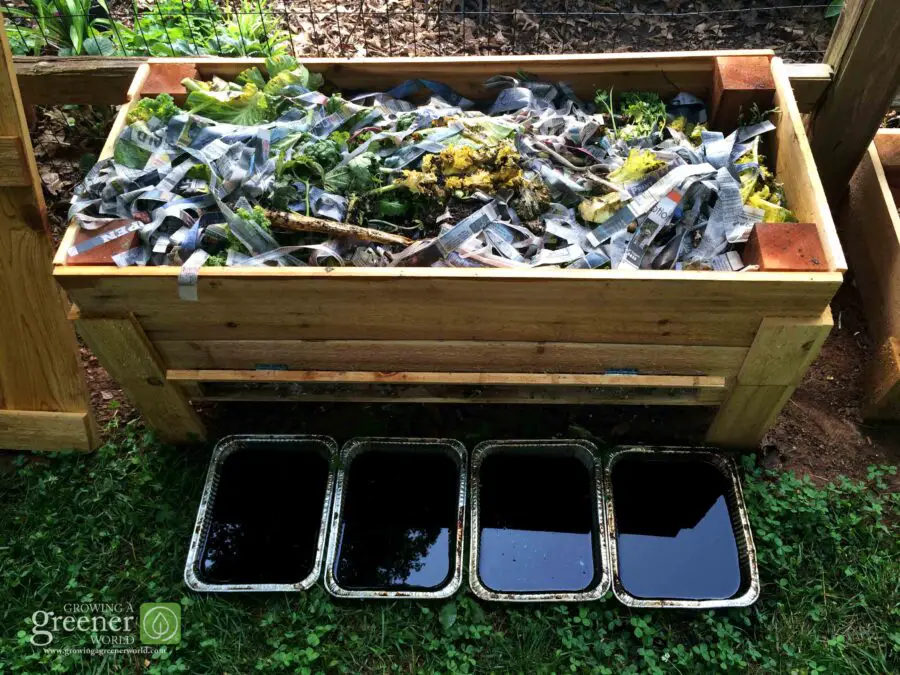
The potential negative impacts of feeding worms certain types of food, such as plastics and other non-biodegradable materials
Feeding worms certain types of food, such as plastics and other non-biodegradable materials, can have negative impacts on both the worms and the overall health of the compost or worm bin.
One potential negative impact is the risk of physical injury to the worms. Plastics and other non-biodegradable materials cannot be broken down by worms, and they can accumulate in the worm bin over time. If worms ingest these materials, they can become stuck in the digestive tract, causing physical injury or death. In addition, the presence of these materials can make it difficult for worms to move around freely and may hinder their ability to feed and reproduce.
Another negative impact is the risk of contaminating the compost or worm bin with toxic chemicals. Some plastics and other synthetic materials may contain harmful chemicals that can leach into the soil and potentially contaminate the compost or worm bin. This can be harmful to both the worms and any plants that are grown using the compost.
Additionally, feeding worms certain types of food can affect the overall health and balance of the compost or worm bin. If the worms are not given a balanced diet of organic materials, they may not receive the nutrients they need to stay healthy and reproduce. This can lead to a decline in the population of worms, which can negatively impact the efficiency of the composting process.
It is important to avoid feeding worms non-biodegradable materials and to provide them with a balanced diet of organic materials in order to maintain the health and balance of the compost or worm bin. By following these guidelines, you can help to ensure that your worms are well-fed and healthy, and that your compost bin or worm bin is functioning efficiently.
In conclusion
Worms are important decomposers in many ecosystems and play a vital role in the composting process. They have a simple yet efficient digestive system that allows them to break down a wide range of organic materials, including fruit and vegetable scraps, coffee grounds, and shredded paper or cardboard. However, there are some materials that worms cannot break down, including non-biodegradable materials such as plastics, metal, and glass, as well as highly processed or refined foods. It is important to avoid feeding worms these materials, as they can cause physical injury or death, contaminate the compost or worm bin with toxic chemicals, and affect the overall health and balance of the system.
To ensure the health and well-being of worms and the efficiency of the composting process, it is important to provide worms with a balanced diet of organic materials and avoid making common mistakes such as overfeeding, feeding the wrong types of food, or not properly preparing or storing food.
